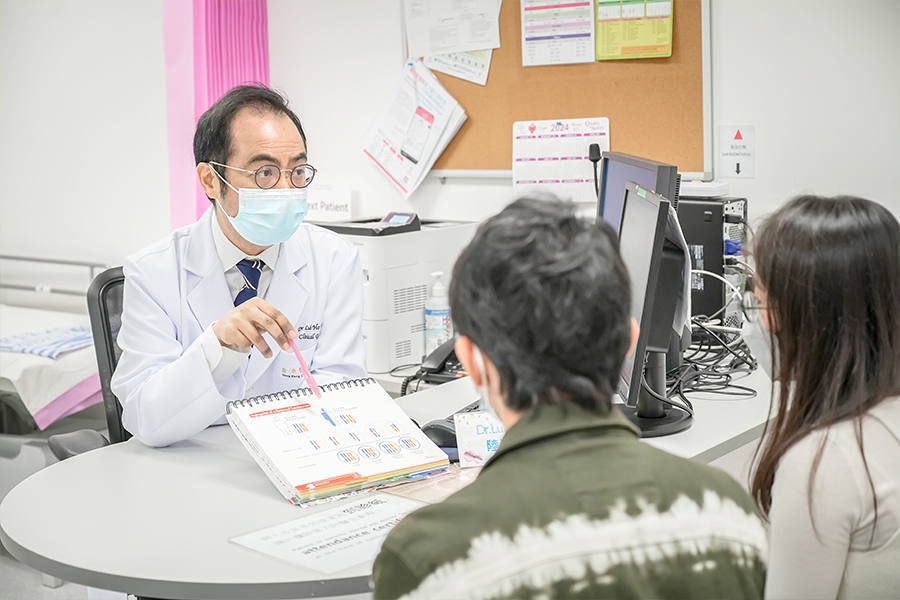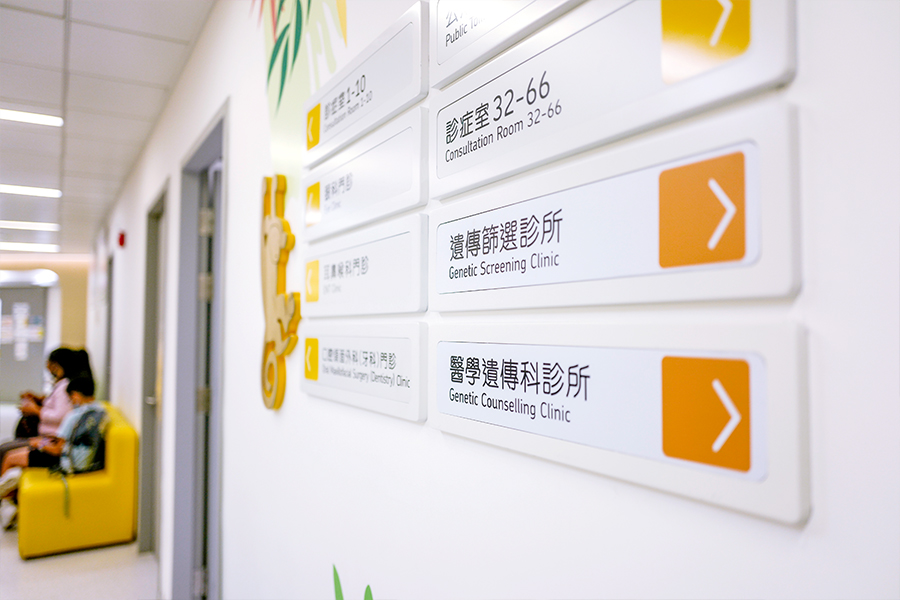Genetic unit offers one-stop service to patients
 The Hospital Authority (HA) took over the Clinical Genetic Service previously run by the Department of Health last year. The Hong Kong Children’s Hospital (HKCH) now provides a one-stop genetics and genomics service covering assessment, investigation, diagnosis, treatment, counselling, and prevention. Cross-specialty clinic has also been set up to provide consultations by the Clinical Genetics Service Unit (CGSU) and other specialties, which helps our patients and families to formulate their management plan and reduces the waiting times. CGSU Consultant Dr Luk Ho-ming explains, “most patients are not diagnosed until they are assessed by genetic doctors or undergo genetic testing after consulting many specialists. As soon as patients get a diagnosis, they feel relieved, and they can have personalised treatment plan and understand their future reproductive risk in the family.”
The Hospital Authority (HA) took over the Clinical Genetic Service previously run by the Department of Health last year. The Hong Kong Children’s Hospital (HKCH) now provides a one-stop genetics and genomics service covering assessment, investigation, diagnosis, treatment, counselling, and prevention. Cross-specialty clinic has also been set up to provide consultations by the Clinical Genetics Service Unit (CGSU) and other specialties, which helps our patients and families to formulate their management plan and reduces the waiting times. CGSU Consultant Dr Luk Ho-ming explains, “most patients are not diagnosed until they are assessed by genetic doctors or undergo genetic testing after consulting many specialists. As soon as patients get a diagnosis, they feel relieved, and they can have personalised treatment plan and understand their future reproductive risk in the family.”
Asking family history on first appointment
The CGSU at the HKCH serves patients of all ages with suspected or confirmed genetic conditions, referred from both the public and private sectors. Misdiagnosis and delay in diagnosis are common for genetic diseases all around the world. “Because most genetic diseases do not have specific signs and symptoms, without the inputs of genetic doctor and genetic testing, patients are often only diagnosed after average of five to seven years as mentioned in literatures,” says Dr Luk. “Assessments and testing provided by the genetic team can help patients to have early accurate diagnosis and receive personalised treatment as soon as possible.”On the first appointment, the genetic doctor will ask for the patient’s detailed family history, draw a family tree for analysis and perform a thorough physical examination. Genetic testing is then provided where appropriate. The doctor will also consult the patients and their families when needed afterwards. CGSU will also provide inpatient consultations for children in HKCH who are suspected to have a genetic disease.
Improving waiting times
Cross-specialty consultation is an essential part of the process, Dr Luk emphasises. “Not every single doctor knows all genetic diseases well, and it is not possible to lean on any single person or specialty to understand all patient cases,” he says. “The CGSU collaborates with different specialties and subspecialties like cardiology, endocrinology, and dermatology to provide professional advice for patients. This not only reduces the patient’s waiting time significantly but also provides holistic care to formulate the personalised management plan for complicated genetic diseases.” Dr Luk cites the case of a boy suspected to have a genetic disease for many years, he was finally diagnosed with Duchenne muscular dystrophy after extensive clinical and research testing. His mother was found to be a genetic carrier. With that, the mother now understands more her reproductive risk and options that she can undergo prenatal screening if she has another child in future. “Once they learned the diagnosis, the whole family was relieved,” recalls Dr Luk. “Although there is currently no cure for most of the genetic diseases, it may have treatment in the future, who knows? At least there is a clear pathway for patient with accurate genetic diagnosis.”
Dr Luk cites the case of a boy suspected to have a genetic disease for many years, he was finally diagnosed with Duchenne muscular dystrophy after extensive clinical and research testing. His mother was found to be a genetic carrier. With that, the mother now understands more her reproductive risk and options that she can undergo prenatal screening if she has another child in future. “Once they learned the diagnosis, the whole family was relieved,” recalls Dr Luk. “Although there is currently no cure for most of the genetic diseases, it may have treatment in the future, who knows? At least there is a clear pathway for patient with accurate genetic diagnosis.”
Understand genetic diseases
Q1: When does a patient require a referral to CGSU?A doctor may refer a case to the CGSU for assessment and genetic counselling in the following circumstances: unusual age of onset for diseases like a child suffers from a disease that usually affects older people such as cancer, when other family members have the similar disease or symptoms, and/or when a patient has unusual serious or non-typical symptoms such as a condition affecting different organs at the same time in the patient.
Q2: Why do some genetic diseases mostly affect males?
Males have one X chromosome and one Y chromosome, while females have two X chromosomes. Some X linked diseases like color blindness, haemophilia, favism (G6PD deficiency), and Duchenne muscular dystrophy, etc. are caused by genetic mutation in genes located in X chromosome. As females have two X chromosomes, if the gene in one X chromosome is faulty, the same gene in another X chromosome may help compensate. When this happens, a female genetic carrier may not have symptoms, however, a male with X linked disease must be symptomatic.
Genetic counselling service video